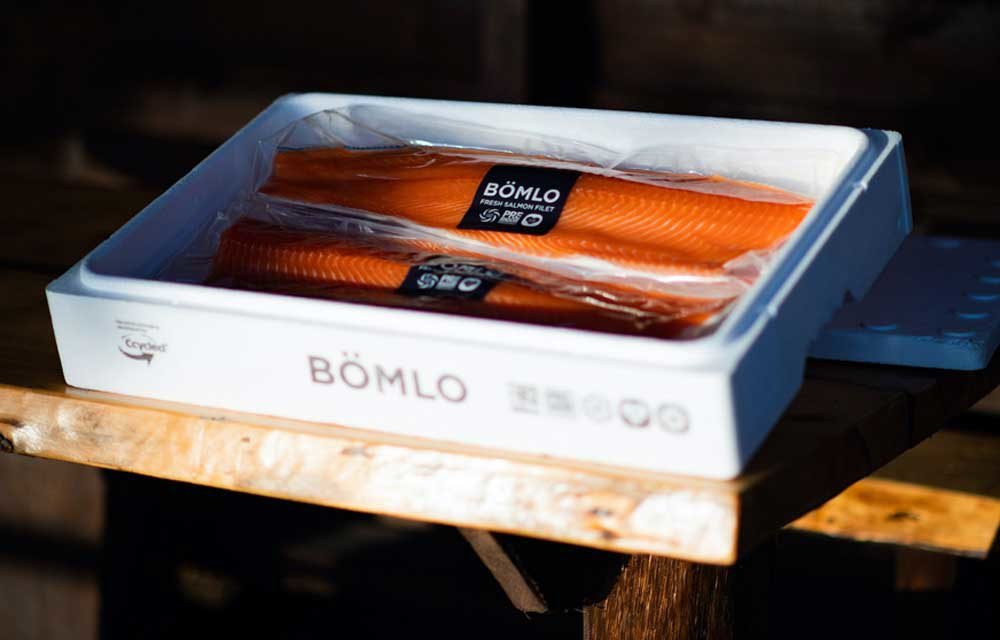Contaminated or mixed plastic waste poses a problem for the circular economy – it can’t be recycled and ends up in dumps or in a thermal recycling process. BASF has now developed styropor boxes made from chemically recycled plastic in a joint project with Vartdal Plast and Bremnes Seashore.

In Norway, Bömlo’s salmon fillets have been being delivered in primary packaging made from chemically recycled plastic since Christmas. This material has been named Ccycled, and is made from expandable polystyrene (EPS) which is particularly suited to use in passive cooling systems.
New fossil resources are no longer needed, as Ccyled is made from pyrolysis oil which is obtained from a thermochemical process called pyrolysis. In 2014, a uniform name was created for styropor: airpop. This name has since become a byword for styropor.
ONE HAND WASHES THE OTHER
Together, the three companies have found a way to operate a circular economy for plastics that are usually difficult to recycle or even unrecyclable. Technology partners supply BASF with pyrolysis oil for this, which is converted into EPS granulate.
Vartdal Plast then manufactures the styropor boxes for fish from this granulate. Simon Nesse Økland, Head of Development at Bremnes Seashore, explains how this is particularly advantageous for transporting food.
“The fish box made from EPS has been an optimal solution for us for quite a while now, as we can ensure compliance with the cold chain during transportation thanks to the amazing properties of this material.
An unbroken cool chain is crucial for food safety and preventing food waste. Here at Bremnes Seashore, we have been won over by the opportunity to test this alternative which has a far lower CO2 footprint than other options, and we place great value on any initiative that promotes a circular economy.“
RECYCLED MATERIAL WITH TOP PROPERTIES
Naturally, a styropor box made from chemically recycled plastic needs to prove itself, particularly as compared to conventional boxes. Here, Ccyled wins over clients thanks to its great thermal insulation, and in addition to this, the boxes are resistant to compression, bending and can be stacked stably.
The recycled styropor thus has the same properties as the conventional alternatives. The ecological balance sheet also looks good: the recycled airpop version reduces CO2 by at least 50%.
“Chemical recycling of plastic waste is not only an important component of the European circular economy, it is also particularly useful for applications which have stringent requirements in terms of quality and safety, for example food packaging and protective packaging or pharmaceutical boxes.
Therefore, we are very proud of the ChemCycling project and to manufacture EPS fish boxes for Bremnes Seashore. We are delighted that we can thus help our customers to achieve their sustainability goals.”
Klaus Ries, Head of Global Business Management for Styrenic Foams at BASF.
A further benefit: Vartdal Plast benefits from the fact that the material can be processed like new material, meaning that the production processes do not need to change. At BASF, recycled and fossil raw materials are mixed in the production Verbund and the proportion of recycled matter is calculated and allocated via a mass balance. Both the process of allocation and the product are certified by an independent testing authority.
A MAKEOVER FOR A FAMILIAR MATERIAL

Styropor has been a well-known material for 70 years, and is particularly popular in passive cooling systems. Therefore, the boxes are gaining ground both in the pharmaceutical industry and the food industry.
The world’s first EPS fish boxes are in use in Norway thanks to Ccyled. The standard box from Vartdal Plast, which weighs just 600 grams, can hold around 22 kilograms of fish.
For Vartdal Plast, the new boxes are particularly amazing because they are recyclable. In Scandinavia and other European countries, the boxes are collected, compressed, crushed and recycled.
The company operates two high-capacity compacting plants for EPS waste in Norway. In the long term, Vartdal Plast is looking to feed the compacted material back into their Vartdal Loop product series and thus manufacture boxes that are made entirely from recycled styropor.
